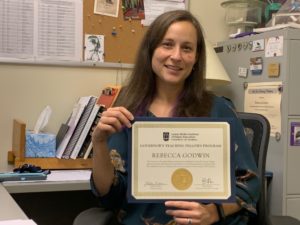Piedmont University’s Rebecca Godwin Implements Student-Centered Strategies Gained During Prestigious Summer Fellows Program

Piedmont University Assistant Professor of Biology Rebecca Godwin recently participated in the Governor’s Teaching Fellows Program, where she learned a variety of student-centered teaching strategies that she’s implementing in her genetics course this semester.
Already, she is seeing a difference in how her students are responding to her, the coursework, and the assignments ahead.
“It’s interesting watching my students get used to having more autonomy in the classroom and driving their own learning more than perhaps they have up to this point in their education,” said Godwin.
“We’re all learning together, and growing and stretching — for them, it’s as students, for me, it’s as their instructor.”
Godwin, who made international news in 2021 for discovering 33 previously unnamed spider species, has taught at Piedmont since 2020, but this is her first semester teaching genetics. The two-week Fellows Program provided her with the time and resources she needed to design the course to be student-centered — from the syllabus to the final exam.
The Governor’s Teaching Fellows Program was established in 1995 by former Georgia Gov. Zell Miller. Offered through the University of Georgia’s Louise McBee Institute of Higher Education, the Fellows Program provides higher education faculty members from accredited public and private institutions throughout the state with opportunities to develop and expand their teaching practices.
Godwin was one of 12 faculty members accepted to the 2022 Fellows Program. The other participants represented Andrew College, Brenau University, Columbus State University, Georgia Gwinnett College, Georgia Southern University, Mercer University, Middle Georgia State University, University of North Georgia, University of West Georgia and Valdosta State University.
Fellows were selected based on their teaching experience, their interest in continuing instructional and professional development, their ability to make a positive impact on their own campus, and a strong commitment by their home institution for release time and other forms of support for the duration of their participation in the program.
The other participants were also interested in student-centered teaching strategies, which created an ideal environment in which to design her course, Godwin said.
“We learned how to lead discussions, create tilted or flipped classrooms — which are instructional strategies aimed at increasing student engagement — and ideas for getting students more involved in classroom discussions,” Godwin said.
“It was all very practical and inspiring.”
As an example of the strategies Godwin implemented in her genetics course, her syllabus now includes a letter to students in which she describes her motives, the topics students will study and why, and the purpose of assignments and exams.
“This strategy is about being more personal and conversational with students, opening up to them and being honest about my intentions for the course, and getting their buy-in at the beginning,” Godwin said.
The course will conclude with an “unessay,” a final assignment that students will tailor to their individual interests and strengths. Students will choose a topic involving genetics and create an artifact based on their research.
“I have one student who is already interested in studying genetics within her family and another who wants to create educational TikTok videos about genetics. Students could also create a poster, a painting, a podcast, a sculpture, a written report. It’s a very student-driven assignment,” Godwin said.
“The unessay is designed to help them find their interest, take a deep dive into the topic, and play to their strengths.”
Godwin intends to implement similar student-centered strategies in her invertebrate biology course. She’s also still in contact — and swapping ideas — with her colleagues from the Fellows Program, seeking even more ways to “reduce the hierarchical nature” of her courses, creating a learning environment that engages students from day one.
“Just like my students, I’m always learning and looking for was to improve,” she said. “I’m always adding tools to my belt that will help me provide them with the best educational experience I can.”